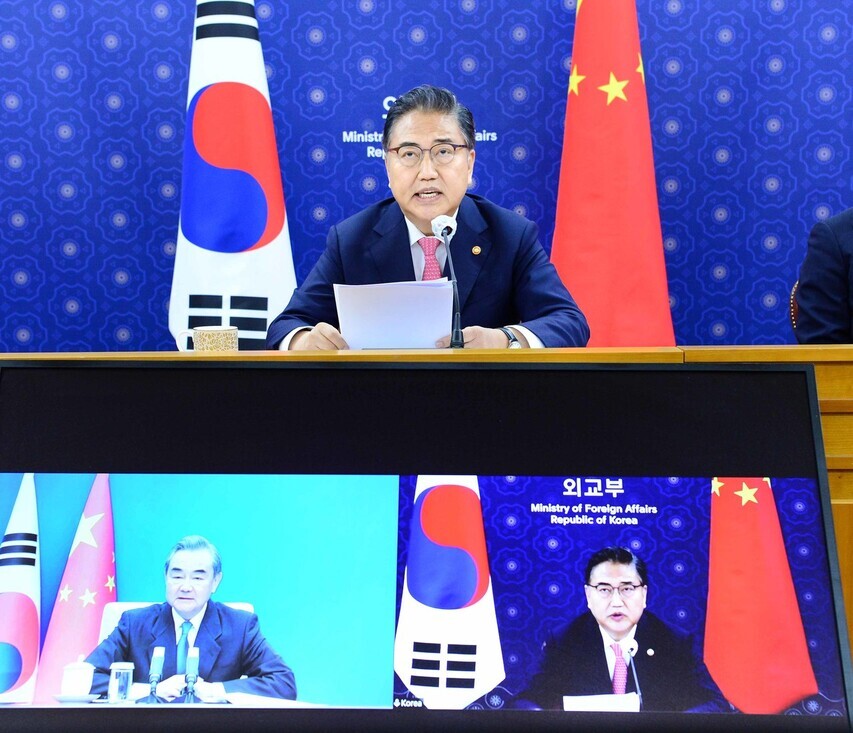hankyoreh
Links to other country sites 다른 나라 사이트 링크
Beijing cautions S. Korea against joining US-led Indo-Pacific economic initiative

In the first videoconference between South Korea and China’s top diplomats since Yoon Suk-yeol became president of Korea, Chinese Foreign Minister and State Councilor Wang Yi cautioned Korea against taking part in the US-backed Indo-Pacific Economic Framework (IPEF).
China’s Ministry of Foreign Affairs released a statement summarizing the videoconference on Monday afternoon. The most striking part of the statement was Wang’s remark that the two countries ought to oppose “the negative tendency of decoupling” and “maintain the stability and smoothness of the global industrial and supply chains.”
Wang referred to four areas that need to be strengthened in the Korea-China relationship in a bullet list that is typical of his manner of speaking. While moving on to the area of mutually beneficial cooperation (following communicative cooperation), Wang noted in passing that “decoupling should be opposed.”
In an earlier press release, Korea’s Ministry of Foreign Affairs did not bring up anything as sensitive as Wang’s comments and only stated, “Considering the enormously changed international standings of the two countries, the two sides agreed to continue close cooperation on regional and international stages.”
Wang’s full remarks on this matter are quoted below:
“Second, [China and South Korea must] strengthen mutually beneficial cooperation and work together for development and revitalization. China's huge market will provide a steady stream of power for the ROK's long-term development. With respective strengths in the fields of digital economy, artificial intelligence and new energy, the two sides can cooperate to achieve the positive effect of ‘one plus one is greater than two.’ We should proceed from our respective and common interests, oppose the negative tendency of ‘decoupling’ and ‘cutting off chains,’ and maintain the stability and smoothness of the global industrial and supply chains.”
Wang’s remarks about opposing decoupling between Korea and China appear intended as a response to Yoon Suk-yeol’s apparent declaration that morning that he wants Korea to join the IPEF, which is being organized by the Biden administration.
“When US President Joe Biden visits Korea this week, we will discuss ways to strengthen cooperation on global supply networks through the Indo-Pacific Economic Framework,” Yoon had said during a policy address to the National Assembly.
Wang’s remark that the huge Chinese economy is driving Korean development can be seen as a warning that the Korean economy might be harmed if Korea gets too involved in the US-led IPEF.
Wang went on to make it even clearer that China is opposed to Korea tagging along behind the US.
“Thirty years ago, the two countries got rid of the shackles of the Cold War and opened a new chapter of cooperation. Today, it serves the fundamental interests of China and the ROK to keep the region open and inclusive, guard against the risk of a new Cold War, and oppose bloc confrontation,” he said.
Wang described the US’ containment of China and Russia in terms of a “new Cold War” and asked Korea not to cooperate with that trend.
The IPEF is an economic forum oriented around the US and Japan which also covers Australia, New Zealand, Singapore, and even India. The IPEF is generally believed to be targeted at hemming in China.
While the framework includes four topics — restoring supply chains, the digital economy, moving away from carbon and opposing corruption — it’s widely expected to focus cooperation on building supply chains that can circumvent China.
An official from Yoon’s team took exception to that view. “[The IPEF] is designed to respond to a new economic and trade environment and is not necessarily aimed at China,” the official said.
The US has repeatedly stressed the IPEF’s importance.
“We need a new model of economic engagement and trade [for the Indo-Pacific],” White House Press Secretary Karine Jean-Pierre said on May 16.
Biden is expected to officially launch the IPEF in Japan, which he will be visiting after Korea.
By Choi Hyun-june, Beijing correspondent
Please direct questions or comments to [english@hani.co.kr]

Editorial・opinion
![[Column] Season 2 of special prosecutor probe may be coming to Korea soon [Column] Season 2 of special prosecutor probe may be coming to Korea soon](https://flexible.img.hani.co.kr/flexible/normal/500/300/imgdb/original/2024/0426/3317141030699447.jpg) [Column] Season 2 of special prosecutor probe may be coming to Korea soon
[Column] Season 2 of special prosecutor probe may be coming to Korea soon![[Column] Park Geun-hye déjà vu in Yoon Suk-yeol [Column] Park Geun-hye déjà vu in Yoon Suk-yeol](https://flexible.img.hani.co.kr/flexible/normal/500/300/imgdb/original/2024/0424/651713945113788.jpg) [Column] Park Geun-hye déjà vu in Yoon Suk-yeol
[Column] Park Geun-hye déjà vu in Yoon Suk-yeol- [Editorial] New weight of N. Korea’s nuclear threats makes dialogue all the more urgent
- [Guest essay] The real reason Korea’s new right wants to dub Rhee a founding father
- [Column] ‘Choson’: Is it time we start referring to N. Korea in its own terms?
- [Editorial] Japan’s rewriting of history with Korea has gone too far
- [Column] The president’s questionable capacity for dialogue
- [Column] Are chaebol firms just pizza pies for families to divvy up as they please?
- [Column] Has Korea, too, crossed the Rubicon on China?
- [Correspondent’s column] In Japan’s alliance with US, echoes of its past alliances with UK
Most viewed articles
- 1‘We must say no’: Seoul defense chief on Korean, USFK involvement in hypothetical Taiwan crisis
- 2AI is catching up with humans at a ‘shocking’ rate
- 3The dream K-drama boyfriend stealing hearts and screens in Japan
- 4[Column] Can we finally put to bed the theory that Sewol ferry crashed into a submarine?
- 5S. Korea “monitoring developments” after report of secret Chinese police station in Seoul
- 6[Editorial] Yoon cries wolf of political attacks amid criticism over Tokyo summit
- 7Doubts remain over whether Yoon will get his money out of trip to Japan
- 8[Photo] “Comfort woman” survivor calls on president to fulfill promises
- 9[Editorial] Was justice served in acquittal of Samsung’s Lee Jae-yong?
- 101 in 5 unwed Korean women want child-free life, study shows